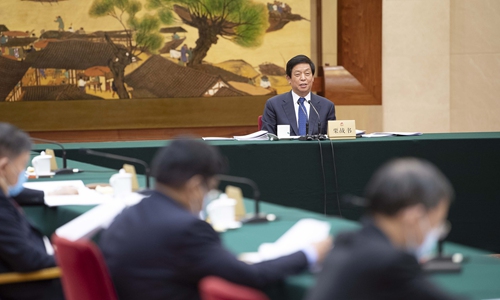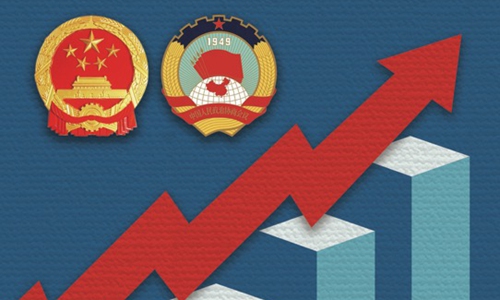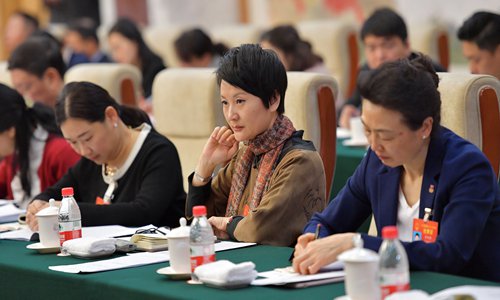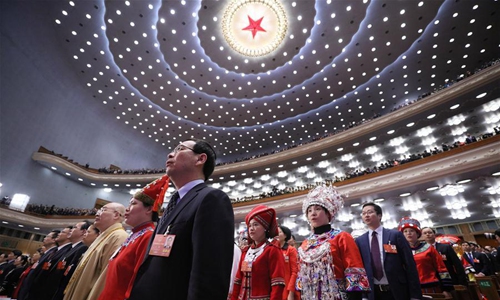
Li Zhanshu, chairman of the Standing Committee of the NPC presides the 50th chairman's session of the Standing Committee of the 13th NPC on April 17 in Beijing. Photo: Xinhua
China's most important annual political meetings, the "two sessions," which have been postponed for more than a month due to the unexpected coronavirus epidemic and now set to convene in late May, will focus on post-pandemic efforts from all walks of life, participants revealed.
Zhu Zhengfu, a prominent lawyer and a member of the 13th National Committee of the Chinese People's Political Consultative Conference (CPPCC), China's advisory body, told the Global Times that he will submit a proposal suggesting the central government give every citizen an epidemic subsidy of 2,000 yuan ($283), in order to relieve difficulties and stimulate economic development.
The amount is equivalent to the average monthly consumer spending in 2019. Although it is not a large sum, it is a lifeline to people in need, and it can directly help them overcome and tide over the current difficulties, Zhu said.
Zhu said the subsidies can help small- and medium- enterprises and stimulate the economy.
"The central government will invest no more than 3 trillion yuan, and the money is required to be consumed within six months. People will use the money to buy daily necessities and services, thus injecting blood into those businesses," he said.
Similar subsidies have been announced in other countries including Canada, Japan and Italy.
Zhu stressed it will greatly enhance the credibility of the Chinese government and the people's trust in it.
The plenary session of the National People's Congress (NPC), the country's top legislature, will begin on May 22 in Beijing, according to a decision made by the NPC Standing Committee on Wednesday morning.
It was also proposed that the third annual session of the 13th National Committee of the CPPCC open in Beijing on May 21.
With the epidemic subsiding, economic and social life is gradually returning to normal in China, although the Chinese public is still on high alert for new waves of infections.
Zhang Shuhua, a CPPCC National Committee member and director of the Institute of Political Sciences of the Chinese Academy of Social Sciences (CASS), told the Global Times that the agendas of this year's "two sessions" will focus on the epidemic, including relieving the impact the epidemic has had on various sectors, releasing concrete and scientific policies to guide the overall resumption of work and production, discussing large-scale plans to restart the economy, improving public health and public security mechanisms, and crafting measures to cope with a recessing global economy.
His view was echoed by both Jia Qingguo, a member of the standing committee of CPPCC National Committee and a professor at Peking University, and Han Fangming, deputy chairman of the Foreign Affairs Committee of the CPPCC National Committee and chairman of a think tank, the Charhar Institute.
According to Tam Yiu-chung, Hong Kong's deputy to the NPC Standing Committee, a regular standing committee session from Sunday to Wednesday focused on epidemic-related topics, with the call for efforts to make sure that all the economic work will be carried out this year, including comprehensive poverty alleviation work nationwide, and discussions of legislative amendments to public health laws.
"We'll draw lessons from the country's epidemic combat to improve amendment work," Tam told the Global Times Wednesday.
A number of CPPCC National Committee members have prepared epidemic-related proposals. Lian Yuming, head of the Beijing-based Global City Development Corporation Council, told the Global Times Wednesday that he has proposed a plan to secure personal data during public health emergencies. He also proposed suggestions aimed at post-epidemic poverty alleviation to help the country achieve its goal of becoming an all-round well-off society.
Wu Zhiliang, president of the Board of Directors, the Macao Foundation, told the Global Times that he plans to elevate the role of communities in public emergencies given the coronavirus situation in Macao.
Macao has reported a total of 45 coronavirus cases, almost all of which were classified as imported cases. The special administrative region has been spared a community outbreak, which Wu believes was an achievement that communities played a major role in.
"Macao is a multi-community society and communities are important to people's lives, especially during a public crisis. During the recent epidemic, the communities collected medical supplies from the world, raised donations for the mainland, and assisted the elderly. Therefore, communities play an irreplaceable role in maintaining Macao's social stability," said Wu.
Besides proposing epidemic-related plans, CPPCC National Committee members, who come from all walks of life, are also expected to discuss topics within their range. Han, chairman of the Charhar Institute, will focus on policies aimed at dealing with the changing international situation and local governments' credibility. Lian of the Global City Development Corporation Council has proposed plans to develop villages nearby the Great Wall and craft a Capital Law to promote the governance capability of the capital. Zhang from CASS is raising a plan for utilizing the arrangement of universities across the country with the aim of advancing balanced education resources and technological innovation.
Insiders have revealed that this year's "two sessions" will be shortened to seven days. Analysts believe this is enough for political discussions and debates to take place during this special epidemic period.
"Besides face-to-face meetings, participants can engage in discussions online. Since the epidemic, the online platform for CPPCC members has been active and all views can be fully expressed," Han told the Global Times.






